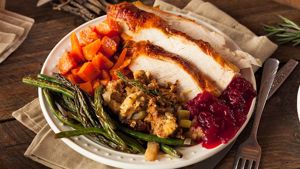The kitchen is the heart of many homes: we love to dine, cook, and even just hang out in this homely hub. With this area being used by everyone in the household, it’s as important as ever to have good kitchen hygiene.
But, are Brits aware of their unhygienic cooking ways? While we may think our kitchen practices are sanitary, they may in fact be doing more harm than good.
With this in mind, Tap Warehouse surveyed British adults to reveal just how hygienic they are in the kitchen. We’ve uncovered the unsanitary practices prior to cooking, before exposing what Brits get up to whilst cooking.

9 in 10 Brits are Risking Food Poisoning Because They Don’t Know This Simple Trick
Did you know your shopping bags could cause food poisoning? The Food Standards Agency warns that bacteria from raw meat can be transferred to ready-to-eat food and shopping bags. Even if the raw meat appears well wrapped, there could be harmful bacteria on the packaging.
Yet, our research has found Brits risk contracting food poisoning every time they do the food shop. 87% admitted to not cleaning their shopping bags or using different bags for raw and ready to eat food.
The FSA recommends colour coding your bags to keep raw and ready to eat food separate. You should also wash the bags regularly. Canvas bags can go straight in the washing machine. Whereas nylon bags can be hand washed with soap and water.
2/5 of Brits are Storing their Meat Wrong - Increasing the Chances of Contaminating other Fridge Food
Our previous findings uncovered the most hygienic way to store raw meat, poultry and fish is on the bottom shelf of your fridge. Doing it this way stops the raw meat dripping on to other foods and contaminating them.
However, our survey has revealed that a staggering 2/5 (40%) of Brits do not store their raw meat, poultry, and fish on this shelf.
In fact, a worrying 1/8 (12%) admitted to storing their raw animal protein in the fruit and veg drawer. Which could mean Brits are contaminating their fresh produce with raw meat juice. Yikes.
Similarly, 1 in 8 (12%) Brits confessed to storing their raw meats on the middle shelf. Perfect for all that meat leakage to drip on to other foods.
Louise Roberts, Director of Food Safety Company, Alimenti, says by not storing raw meat on the bottom shelf, “blood and other fluids which may contain high levels of pathogens could drip onto the ready to eat food and contaminate the food with pathogens.”
Which is alarming as “if consumed without any further treatment, such as cooking, the ready to eat food may cause illness.” Louise Roberts adds.
Nearly 1/3 of Brits Don’t Wash Their Hands During Cooking
We all know how important it is to clean our hands before cooking. Especially if you don’t want to risk making your loved ones ill. But did you know it’s just as essential to wash hands in-between steps?
Even if you’re preparing ready to eat food and vegetables, it’s key to wash hands so you don’t risk transmitting any germs. However, almost a third (31%) of Brits do not wash hands during cooking steps.

37% of Brits Splatter Germs Across the Kitchen by Wrongly Washing Poultry
It appears a surprising amount of us believe washing raw poultry is a safe cooking practice. 37% of those surveyed said they wash raw poultry before cooking it. But, you most definitely can skip this step.
Food safety expert, Louise Roberts, says “The spray from a piece of poultry being washed can travel up to 50cm. This spray may contain Salmonella and E.coli, as well as other pathogens. It can land on clean crockery on a draining rack, as well as the clothes and face of the person washing the poultry.”
Not to mention that studies have found that over one quarter of turkey meat carries campylobacter. A bacteria that can cause food poisoning. It only takes a few of this bacteria’s cells to cause food poisoning, so it’s important not to wash poultry under the tap.
So, how can you ensure you’re cooking turkey safely? Luckily, when you cook poultry thoroughly, you kill most of the pathogens. To check it’s cooked all the way through, cut into the thickest part of the meat to make sure it’s piping hot and there’s no pink meat.
However You Should Be Washing Your Vegetables to Avoid Contracting E.Coli
Whilst you don’t need to wash your poultry, you should be washing your fruit and vegetables. Many of us consider the risk of food poisoning from fresh produce to be small, with 21% of Brits confessing to not washing their fruit and veg. However, soil can get stuck on vegetables which could then make you sick if it has bacteria in it.
Louise Roberts says: “Apart from any insects which may be living on the produce, there may also be pathogens, as the ground they are grown in is likely not sterile. Most of the bacteria will be in the soil, so ensure to remove this by cleaning or peeling.”
1/4 of Brits Use the Same Chopping Board Throughout Cooking, Contaminating Food
Almost 1/4 (24%) of Brits admitted to using the same chopping boards for different food items when cooking. Though, research shows you really need at least two chopping boards for cooking.
Unfortunately, bacteria can thrive in tiny crevices of your chopping board. So, if you’re using the same one throughout cooking, you’re likely transferring bacteria from raw meat to other foods. This isn’t so much of a problem for meat that’s cooked to a safe temperature. However, fruits and vegetables will likely not receive the same treatment – thus picking up any germs from the board.
Almost 1/3 of Men Don’t Clean Their Kitchen Surface Before Cooking
When it comes to sanitising the kitchen before cooking, it appears that women are slightly cleaner. 75% of women confirmed they use antibacterial spray to sanitise the kitchen surface, compared to just 58% of men.
Astonishingly, a further third (29%) of men said they do not clean the surface before cooking at all.
Cleaning the kitchen surface is essential to keep your food safe. The kitchen is often the hub of the home and used by many members of the household throughout the day. So, if you’re not cleaning before cooking there could be all sorts of bacteria touching your food. Which is also why you should clean your hands. But 1 in 14 (7%) of men confessed to not washing their hands at all while cooking, compared to 1 in 25 (4%) of women.
Now you know all about unhygienic cooking practices, why not discover which germs are hiding in your home?








